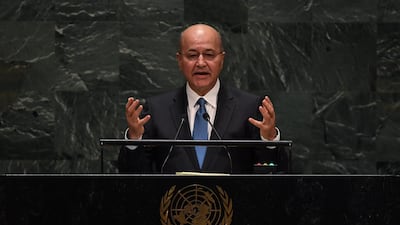Iraq is on track to hold national elections in October, but the road will be difficult as a result of the delicate security situation, President Barham Salih said on Tuesday.
Mr Salih was asked in an interview with Sky News Arabia whether the elections will be held in time amid the assassinations of activists and continuing attacks by Iran-backed militias.
“The answer is: It’s hard,” he said.
“It is confirmed that the elections will be held in October and they must be held,” he said. “This is a promise we have made as it is a public demand and a political agreement,” he said.
Holding early elections based on a new election law was one of the key demands of the pro-reform protests that began in October 2019.
Other demands were the removal of the ruling political elite – which has been in place since the 2003 US-led invasion that toppled Saddam Hussein – improving deteriorating public services, fighting endemic corruption and better job opportunities.
Soon after taking office in May last year, Prime Minister Mustafa Al Kadhimi proposed early elections for June 6, 2021 – a year earlier than scheduled. These were later shifted to October 10.
Under pressure from protesters, the Iraqi parliament approved a new election law last year that gives independent candidates the chance to win seats on the legislative body.
Parliament is now introducing new amendments for the Federal Court law, which must ratify the results.
The elections, Mr Salih said, will be important because they “will pave the way for a new era”.
He said transparency was important to restore trust in the process among Iraqis.
Evaluating the post-Saddam period, Mr Salih said that the current political system is broken and needs to be reviewed.
“This system doesn’t meet the requirements of Iraqis, it has structural defects,” he said.
“To be honest, Iraqis deserve better life, better services, better education system and better representation in governing,” he said.
He described the state of public services as “very painful” and renewed his calls for a “new social and political contract”.
He echoed the prime minister's calls to hold a national dialogue after the first papal visit to the country this month.
“Yes, we need a national dialogue, [we need] to sit around the table to talk in-depth about these issues and the defects,” he said.
“The situation can’t be continued as is. We have to have boldness and the eagerness to protect the country and say: enough, we need a new situation,” he said.
Before 2003, power was concentrated in the hands of Saddam and his Baath Party.
Government posts, especially key ones, were given to Baath Party members.
But since 2003, the Americans introduced a new political system in the country based on national elections to be held every four years to select a parliament, from which the government is formed.
Under an unofficial agreement, Iraq’s presidency – a largely ceremonial role – is held by a Kurd, while the prime minister's post is reserved for a Shiite and that of parliament speaker, for a Sunni. Other government posts are divided among the country’s political parties based on their religious and ethnic background.
Under this system, the country suffered from widespread corruption, mismanagement and bad public services, while loyalties are now to political parties rather than the state.


